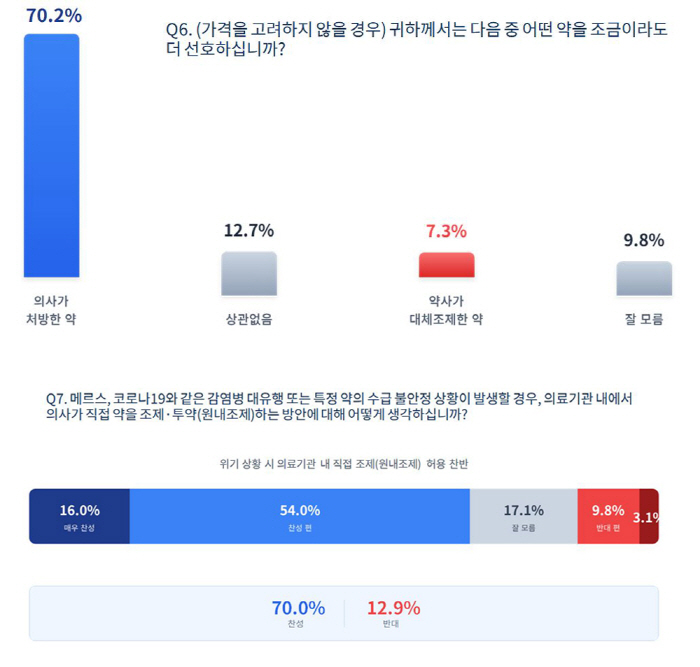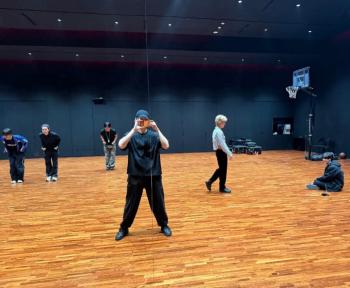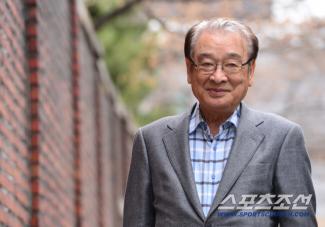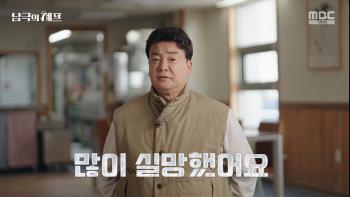70% of the people prefer medicine prescribed by doctors...74% approve of the drug division option
Nov 27, 2025
The Korean Medical Association's Special Committee on National Health Protection Measures (Chairman Kim Taek-woo, Pan-dae) announced the results of a public poll on the prescription of ingredient names on the 27th.
This is because drug supply and demand instability occurred during the COVID-19 pandemic, and the prescription of ingredient names emerged as a major agenda. In the National Assembly, an amendment to the law appeared, requiring the prescription of limited ingredient names for unstable drugs and even a punishment clause of imprisonment or punishment for violations. The management of unstable supply and demand drugs is also a national task of the Lee Jae-myung administration.
This survey is a quantitative online survey of 1,007 adults aged 18 or older nationwide for three days from November 18th to 20th, commissioned by the Korean Medical Association. ▲Awareness of the promotion of gender prescription bills ▲ Understanding the alternative assistance system and the obligation to notify ▲ Recognition of legal responsibility ▲ Preference for drug selection ▲ Opinions on the introduction of the selective division of labor were asked extensively. In particular, it also included public opinions on key policy issues, such as the impact of the ingredient name prescription on public safety and medical sites, and the degree of sympathy for concerns raised by government ministries.
Hwang Gyu-seok, chairman of the committee's public relations committee, said, `In the wake of the recent instability in the supply and demand of medicines, bills have been proposed in the National Assembly to force the introduction of ingredient names without public agreement with the medical community""Although the clear prescription is an important issue that changes the subject of drug choice, discussions on the responsibility for weakening accidents and the impact on public health have been excluded.", he pointed out.
In particular, for the 25 years of the division of medicine, the Korean people have had to travel to and from hospitals and pharmacies twice, and have been keeping the system well despite serious inconveniences such as double spending"Without re-evaluating how the division of medicine affects the public's health even in the environment of public inconvenience and additional payment of health insurance premiums to pharmacies, some lawmakers who have jumped on the line of work selfishness have proposed a bill that undermines the basis of the division of medicine and has an enormous impact on the public's health, causing a social stir." he criticized.
Chairman Hwang said "Despite the rapid change in the medical environment, objective data on how accurately the public is aware of the current system and the ingredient name prescription, and what system the people, who are actual medical consumers, want were lacking."," he said, explaining the background of the survey.
According to the survey, 44.5%, or nearly half of the people, said they had no knowledge of the ingredient name prescription bill currently pending in the National Assembly. Only 15.4% said they were familiar with it.
Pharmacists' awareness of the 'alternative assistance' and 'alternative assistance notification obligation' system, which is possible in the current legislation, was similar. 60.6% of respondents said they knew the system, but the 'detailed cognitive class' that they are familiar with remains at 17.5% and 22.7%, respectively. More than half of the people, 57.1%, answered that when a pharmacist replaced a doctor's prescription drug with another drug, and when a weakening accident or side effect occurred in the future, the doctor was not legally responsible.
When the price factor was excluded, 70.2% of the people preferred 'Doctor-prescribed medicine'. On the other hand, only 7.3% of the respondents said that pharmacists prefer alternative drugs.
According to a survey, the public wants to prepare medicine directly by doctors in crisis situations such as the pandemic of infectious diseases or drug sales. Seventy percent voted in favor of floor preparation. Furthermore, 74.2% of the patients expressed their approval for the 'drug division of labor option', which calls for allowing patients to choose between hospital preparation and pharmacy preparation.
The Korean Medical Association stressed that it will continue to do its best to actively communicate with the government and the National Assembly based on objective data and to come up with policies that put public health first.
This is because drug supply and demand instability occurred during the COVID-19 pandemic, and the prescription of ingredient names emerged as a major agenda. In the National Assembly, an amendment to the law appeared, requiring the prescription of limited ingredient names for unstable drugs and even a punishment clause of imprisonment or punishment for violations. The management of unstable supply and demand drugs is also a national task of the Lee Jae-myung administration.
This survey is a quantitative online survey of 1,007 adults aged 18 or older nationwide for three days from November 18th to 20th, commissioned by the Korean Medical Association. ▲Awareness of the promotion of gender prescription bills ▲ Understanding the alternative assistance system and the obligation to notify ▲ Recognition of legal responsibility ▲ Preference for drug selection ▲ Opinions on the introduction of the selective division of labor were asked extensively. In particular, it also included public opinions on key policy issues, such as the impact of the ingredient name prescription on public safety and medical sites, and the degree of sympathy for concerns raised by government ministries.
Hwang Gyu-seok, chairman of the committee's public relations committee, said, `In the wake of the recent instability in the supply and demand of medicines, bills have been proposed in the National Assembly to force the introduction of ingredient names without public agreement with the medical community""Although the clear prescription is an important issue that changes the subject of drug choice, discussions on the responsibility for weakening accidents and the impact on public health have been excluded.", he pointed out.
In particular, for the 25 years of the division of medicine, the Korean people have had to travel to and from hospitals and pharmacies twice, and have been keeping the system well despite serious inconveniences such as double spending"Without re-evaluating how the division of medicine affects the public's health even in the environment of public inconvenience and additional payment of health insurance premiums to pharmacies, some lawmakers who have jumped on the line of work selfishness have proposed a bill that undermines the basis of the division of medicine and has an enormous impact on the public's health, causing a social stir." he criticized.
Chairman Hwang said "Despite the rapid change in the medical environment, objective data on how accurately the public is aware of the current system and the ingredient name prescription, and what system the people, who are actual medical consumers, want were lacking."," he said, explaining the background of the survey.
According to the survey, 44.5%, or nearly half of the people, said they had no knowledge of the ingredient name prescription bill currently pending in the National Assembly. Only 15.4% said they were familiar with it.
Pharmacists' awareness of the 'alternative assistance' and 'alternative assistance notification obligation' system, which is possible in the current legislation, was similar. 60.6% of respondents said they knew the system, but the 'detailed cognitive class' that they are familiar with remains at 17.5% and 22.7%, respectively. More than half of the people, 57.1%, answered that when a pharmacist replaced a doctor's prescription drug with another drug, and when a weakening accident or side effect occurred in the future, the doctor was not legally responsible.
When the price factor was excluded, 70.2% of the people preferred 'Doctor-prescribed medicine'. On the other hand, only 7.3% of the respondents said that pharmacists prefer alternative drugs.
According to a survey, the public wants to prepare medicine directly by doctors in crisis situations such as the pandemic of infectious diseases or drug sales. Seventy percent voted in favor of floor preparation. Furthermore, 74.2% of the patients expressed their approval for the 'drug division of labor option', which calls for allowing patients to choose between hospital preparation and pharmacy preparation.
The Korean Medical Association stressed that it will continue to do its best to actively communicate with the government and the National Assembly based on objective data and to come up with policies that put public health first.
|
This article was translated by Naver AI translator.














